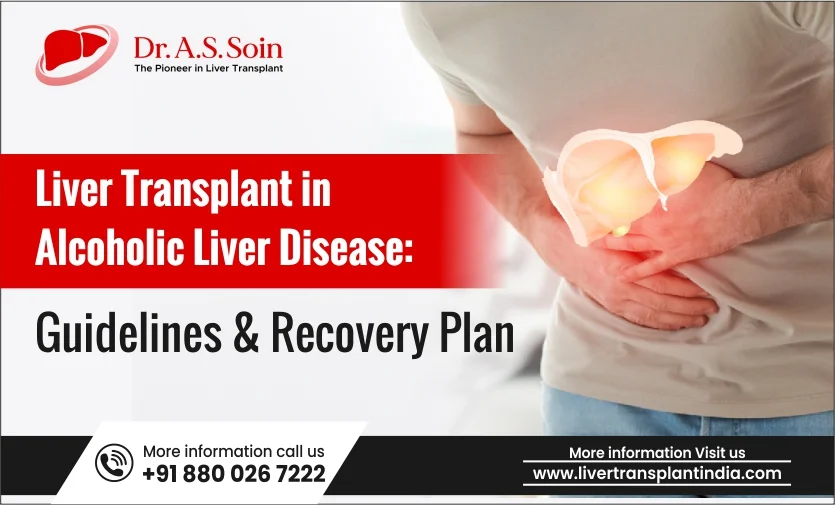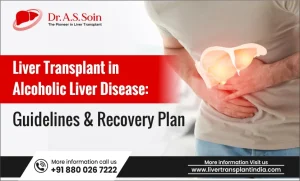When we talk about liver transplants, alcohol is always the elephant in the room.
Everyone knows it — doctors, families, and even the patients themselves — but no one really wants to say it out loud: “My liver failed because of alcohol.”
And yet, alcoholic liver disease (ALD) remains one of the most common reasons for liver transplant worldwide. The irony? It’s also one of the most controversial.
Some people think, “Why give a new liver to someone who drank their old one away?”
Others, especially transplant doctors, see a different side — one that’s about redemption, biology, and human recovery, not punishment.
This blog tries to look at that grey area.
Table of Contents
ToggleWhen Alcohol Starts Winning Over the Liver
The liver is a forgiving organ — until it’s not. It can take years of silent abuse before it gives any sign of protest.
Alcohol, when taken regularly over a long time, triggers inflammation (alcoholic hepatitis), fat deposition (fatty liver), and finally scarring (cirrhosis).
The scary part? The shift from reversible damage to irreversible scarring happens faster than most people imagine.
By the time symptoms appear — yellow eyes, swollen abdomen, confusion, or unexplained weight loss — the liver is already crying for help.
In many cases, medication or lifestyle change can only do so much.
That’s when doctors start discussing liver transplantation — not as a luxury, but as a last resort to save life.
The Big Question: Can Alcoholics Get a Liver Transplant?
Yes — but it’s complicated.
Gone are the days when “alcoholic” was an automatic rejection.
Modern medicine looks at behavioral change, sobriety, and medical eligibility more than just past mistakes.
But it’s not a simple yes/no. There are layers to this decision.
The Abstinence Rule (and Its Evolving Reality)
Traditionally, transplant centers demanded a 6-month abstinence period before even considering a patient for transplant.
It was meant as a test — to see if the patient could stay sober and let the liver heal naturally.
But newer studies found something surprising:
Many patients with severe alcoholic hepatitis — a fast-progressing, deadly form — simply don’t have six months. They would die waiting.
So, now the rule is not rigid anymore.
Instead, it’s based on:
- Medical urgency
- Commitment to lifelong sobriety
- Psychosocial support
- Family environment
Doctors now focus more on the person’s future behavior than on punishing past actions.
As one transplant expert once said — “We are here to save lives, not to judge them.”
Medical Evaluation: Who Actually Qualifies?
Alcohol-related liver disease patients undergo the same detailed assessment as any other transplant candidate, but with extra emphasis on mental health and addiction recovery.
The evaluation covers:
- Severity of liver failure – measured through MELD (Model for End-Stage Liver Disease) score.
- Other organ functions – kidney, heart, and lungs.
- Abstinence record and addiction counseling reports.
- Support system – whether family members are reliable caregivers.
A psychiatrist and an addiction specialist usually sit on the evaluation board. Their role isn’t to “approve or reject,” but to judge motivation and readiness to stay sober after surgery.
Myths People Still Believe
Let’s clear out some noise.
Myth 1: “Alcoholics never change, so transplant is waste.”
→ Fact: Many post-transplant patients with alcohol-related liver disease remain sober for life. The relapse rate is not higher than patients transplanted for other causes.
Myth 2: “Alcoholics damage the new liver too.”
→ Fact: Yes, relapse can harm the new liver — but studies show only a small fraction relapse heavily. Early counseling and strict follow-ups drastically reduce risk.
Myth 3: “Transplants should only go to non-alcoholic patients.”
→ Fact: Medicine doesn’t work on moral grounds. Liver allocation is based on disease severity and survival benefit, not social judgement.
When Transplant Becomes the Only Option
In end-stage cirrhosis caused by alcohol, the liver loses all function. No medication can reverse it.
The patient becomes dependent on external management — tapping fluid from the abdomen, managing confusion, bleeding, infections, etc.
A liver transplant replaces this dying organ with a healthy one — giving up to 90% survival at 1 year in experienced centers.
But the work doesn’t end there.
For alcohol-related cases, the real battle starts after surgery.
The Recovery Plan: What Really Works
There’s a lot written online about recovery, but here’s the honest version — what actually works for patients who had alcoholic liver disease.
1. Build a ‘no-drink’ safety circle before surgery
Transplant success starts before the operation.
Doctors often insist patients attend de-addiction counseling and group therapy sessions. It’s not bureaucracy — it’s survival strategy.
Having a strong support system (family or friends who will hold you accountable) is the most underrated medicine.
2. Medication and follow-up discipline
After transplant, patients must take immunosuppressants daily — to prevent rejection of the new liver.
Skipping doses or mixing alcohol again can cause catastrophic failure.
Doctors also closely monitor liver enzymes, kidney function, and drug levels.
A structured follow-up plan usually looks like this:
- Weekly check-ups for first 3 months
- Monthly till 1 year
- Every 3–6 months after that
Missed appointments can mean missed warning signs.
3. Re-learning daily life
Post-transplant, the body and brain both take time to adjust.
Energy levels rise again, appetite improves, skin clears — but mental discipline is key.
Common changes required:
- Avoiding alcohol forever (even “just one drink”)
- Avoiding raw seafood or unfiltered water (infection risk)
- Staying vaccinated
- Eating high-protein, balanced meals
This phase isn’t about being “normal” again — it’s about building a new normal.
The Emotional Side No One Talks About
It’s not just a physical transformation. It’s emotional detox too.
Many ALD patients struggle with guilt or fear that people see them as “undeserving” of a transplant.
That guilt often drives anxiety or relapse.
That’s why psychological support after surgery is crucial — not optional.
Regular counseling, family therapy, and peer groups help patients rebuild identity and self-worth.
Because the biggest success isn’t just staying alive. It’s staying at peace with your second chance.
The Role of Family: More Important Than Any Medicine
Doctors can transplant the liver, but it’s the family that maintains the transplant.
Every patient who succeeds in long-term recovery usually has someone — a spouse, sibling, or friend — who ensures medicines are taken, follow-ups attended, and emotional lows handled.
The post-surgery phase is full of small temptations and emotional triggers.
Without a dependable support system, even the strongest willpower can crack.
So doctors often counsel family members as deeply as they counsel patients.
A Look at Survival and Outcomes
The data is quietly encouraging.
- One-year survival after transplant for ALD patients is 85–90%, almost identical to other causes.
- Long-term survival (5 years and more) depends mostly on sobriety and medical follow-up.
In centers that provide structured de-addiction support, relapse is less than 10–15%.
So the narrative that “alcoholics waste donor organs” doesn’t hold true anymore.
Science has shifted the story from blame to biology.
What Doctors Want Patients to Understand
If your liver disease is alcohol-related, you don’t need shame — you need structure.
Doctors don’t care how much you drank before; they care how serious you are about changing now.
They want to see:
- Commitment to abstinence
- Openness to counseling
- Regularity in medicines and follow-ups
In fact, patients who’ve overcome alcohol dependence often become the most compliant and health-conscious of all. They know what it means to lose life once.
Post-Transplant Lifestyle Blueprint
If you ask transplant survivors what really changed after surgery, their answers are surprisingly simple.
Here’s what most successful ones do:
- Morning walks and hydration – gentle movement keeps the body tuned.
- Clean diet – cooked food, less salt, more protein.
- Routine medications – no experiments, no skipped doses.
- Zero alcohol and tobacco.
- Regular sleep and stress control – because immunity depends on it.
- Community connection – support groups prevent relapse quietly.
These small habits together create a shield stronger than any medicine.
The Modern Shift: Early Transplant for Severe Alcoholic Hepatitis
A big change happening in the medical world is “early liver transplant” — for patients with severe alcoholic hepatitis who don’t respond to medical therapy.
Earlier, these patients were denied transplant because of the 6-month abstinence rule. Now, in selected, highly motivated cases, doctors perform transplants even after 2–4 weeks of abstinence, if survival chances are otherwise nil.
This approach saves thousands who’d otherwise die waiting.
The results? Surprisingly positive — with similar survival and relapse rates to traditional candidates.
But it’s not a free pass — only patients with clear psychological readiness and strong family backing are considered.
Why This Conversation Matters
There’s still stigma attached to alcoholic liver disease.
Many patients hesitate to even discuss transplant because they assume doctors will judge them.
That silence delays help — sometimes till it’s too late.
But when you strip away the social shame, what remains is a simple medical truth:
Alcohol addiction is a disease, not a character flaw.
And liver transplantation is a scientifically valid treatment for its final stage.
It’s not about giving a “second liver” to someone who failed — it’s about giving a second chance to someone who finally wants to live.
The Road Ahead
Going forward, more transplant centers are adopting integrated care models — where hepatologists, psychiatrists, addiction counselors, and social workers work together from day one.
This multidisciplinary approach is slowly changing outcomes and public opinion.
In future, we’ll likely see:
- Better screening for early liver damage in drinkers.
- Personalized transplant timing based on genetics and disease pace.
- Wider acceptance of alcohol-related liver disease as a legitimate medical indication — not a moral debate.
Final Takeaway
Liver transplant in alcoholic liver disease isn’t about past choices — it’s about future chances.
If a patient shows genuine recovery intent, has family support, and commits to post-transplant discipline, they deserve the same medical opportunity as anyone else.
Medicine has evolved from “who caused the damage” to “who can sustain the cure.”
And that’s how it should be.
Because at the end of the day, a liver doesn’t judge where it came from — it just works to keep you alive.








